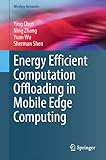Energy Efficient Computation Offloading in Mobile Edge Computing [electronic resource] /
Material type: TextSeries: Wireless NetworksPublisher: Cham : Springer International Publishing : Imprint: Springer, 2022Edition: 1st ed. 2022Description: XIV, 156 p. 38 illus. online resourceContent type:
TextSeries: Wireless NetworksPublisher: Cham : Springer International Publishing : Imprint: Springer, 2022Edition: 1st ed. 2022Description: XIV, 156 p. 38 illus. online resourceContent type: - text
- computer
- online resource
- 9783031168222
- 004.6 23
- TK5105.5-5105.9
Introduction -- 1.1 Background -- 1.1.1 Mobile Cloud Computing -- 1.1.2 Mobile Edge Computing -- 1.1.3 Computation Offloading -- 1.2 Challenges -- 1.3 Contributions -- 1.4 Book Outline -- References -- 2 Dynamic Computation Offloading for Energy Efficiency in Mobile -- Edge Computing -- 2.1 System Model and Problem Statement -- 2.1.1 Network Model -- 2.1.2 Task Offloading Model -- 2.1.3 Task Queuing Model -- 2.1.4 Energy Consumption Model -- 2.1.5 Problem Statement -- 2.2 EEDCO: Energy Efficient Dynamic Computing Offloading for -- Mobile Edge Computing -- 2.2.1 Joint Optimization of Energy and Queue -- 2.2.2 Dynamic Computation Offloading for Mobile Edge -- Computing -- 2.2.3 Trade-off Between Queue Backlog and Energy Efficiency -- 2.2.4 Convergence and Complexity Analysis -- 2.3 Performance Evaluation -- 2.3.1 Impacts of Parameters -- 2.3.2 Performance Comparison with EA and QW Schemes -- 2.4 Literature Review -- 2.5 Summary -- References -- ix -- x Contents -- 3 Energy Efficient Offloading and Frequency Scaling forInternet of -- Things Devices -- 3.1 System Model and Problem Formulation -- 3.1.1 Network Model -- 3.1.2 Task Model -- 3.1.3 Queuing Model -- 3.1.4 Energy Consumption Model -- 3.1.5 Problem Formulation -- 3.2 COFSEE:Computation Offloading and Frequency Scaling for -- Energy Efficiency of Internet of Things Devices -- 3.2.1 Problem Transformation -- 3.2.2 Optimal Frequency Scaling -- 3.2.3 Local Computation Allocation -- 3.2.4 MEC Computation Allocation -- 3.2.5 Theoretical Analysis -- 3.3 Performance Evaluation -- 3.3.1 Impacts of System Parameters -- 3.3.2 Performance Comparison with RLE,RME and TS Schemes -- 3.4 Literature Review -- 3.5 Summary -- References -- 4 Deep Reinforcement Learning for Delay-aware and Energy-Efficient -- Computation Offloading -- 4.1 System Model and Problem formulation -- 4.1.1 System Mode -- 4.1.2 Problem Formulation -- 4.2 Proposed DRL Method -- 4.2.1 Data prepossessing -- 4.2.2 DRL Model -- 4.2.3 Training -- 4.3 Performance Evaluation -- 4.4 Literature Review -- 4.5 Summary -- References -- 5 Energy-Efficient Multi-task Multi-access Computation Offloading -- via NOMA -- 5.1 System Model and Problem Formulation -- 5.1.1 Motivation -- 5.1.2 System Model -- 5.1.3 Problem Formulation -- 5.2 LEEMMO: Layered Energy-efficient Multi-task Multi-access -- Algorithm -- 5.2.1 Layered Decomposition of Joint Optimization Problem -- Contents xi -- 5.2.2 Proposed Subroutine for Solving Problem (TEM-E-Sub) -- 5.2.3 A Layered Algorithm for Solving Problem (TEM-E-Top) -- 5.2.4 DRL-based Online Algorithm -- 5.3 Performance Evaluation -- 5.3.1 Impacts of Parameters -- 5.3.2 Performance Comparison with FDMA based Offloading -- Schemes -- 5.4 Literature Review -- 5.5 Summary -- Reference -- 6 Conclusion -- 6.1 Concluding Remarks -- 6.2 Future Directions -- References. .
This book provides a comprehensive review and in-depth discussion of the state-of-the-art research literature and propose energy-efficient computation offloading and resources management for mobile edge computing (MEC), covering task offloading, channel allocation, frequency scaling and resource scheduling. Since the task arrival process and channel conditions are stochastic and dynamic, the authors first propose an energy efficient dynamic computing offloading scheme to minimize energy consumption and guarantee end devices’ delay performance. To further improve energy efficiency combined with tail energy, the authors present a computation offloading and frequency scaling scheme to jointly deal with the stochastic task allocation and CPU-cycle frequency scaling for minimal energy consumption while guaranteeing the system stability. They also investigate delay-aware and energy-efficient computation offloading in a dynamic MEC system with multiple edge servers, and introduce anend-to-end deep reinforcement learning (DRL) approach to select the best edge server for offloading and allocate the optimal computational resource such that the expected long-term utility is maximized. Finally, the authors study the multi-task computation offloading in multi-access MEC via non-orthogonal multiple access (NOMA) and accounting for the time-varying channel conditions. An online algorithm based on DRL is proposed to efficiently learn the near-optimal offloading solutions. Researchers working in mobile edge computing, task offloading and resource management, as well as advanced level students in electrical and computer engineering, telecommunications, computer science or other related disciplines will find this book useful as a reference. Professionals working within these related fields will also benefit from this book. .


There are no comments on this title.